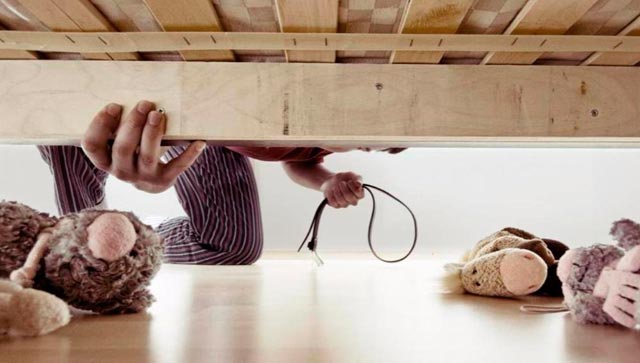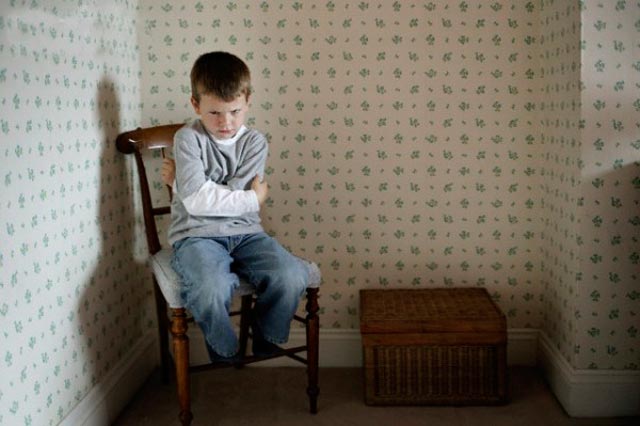Punishment of a child injures the psyche and does not bring benefits. The children's psychologist Irina Mlodik tells:
Punishment is also such a way for the parent to force the child to do what the parent wants. In fact, I believe that education is possible without punishment. Punishment is often a way to express one’s anger, one’s impotence, one’s dissatisfaction with a child. This is an extreme way when we can not cope.
The second reason we want to punish children is sometimes the lack of faith in the fact that if we do not punish, we will not fix in it some kind of “You did a bad thing,” as if the child would continue to do the same .
Such a traditional thing: we found cigarettes from him or caught him smoking, and we need to impress in his mind so much that it is harmful to smoke, that here we are deploying some kind of punishment for our boy, for example. As if he doesn’t know that smoking is bad, that we are against it, that we most likely don’t support him - he knows this very well. But often punishing us is a way to take out all our anger, all our anxiety, all our disappointment. “We would like to have a boy who does not smoke, here is our boy smokes,” and as if to survive all this annoyance from this event from our crumbling expectations about him, we punish him.
In fact, it seems to me that children do not need punishment. It seems to me that if something happened and we can talk with the child, explain to him our feelings, our anxiety, explain the consequences of something, then punishment is not required.
When we, for example, are angry, resentful of him, in powerlessness, and we spanked him, for example, from powerlessness, from what we had already said five times, he did not hear us and we spanked. Then one must at least understand that these are our feelings, that this is our powerlessness, that, relatively speaking, it has nothing to do with it.

Traditionally, parents talk about how they punish children. They say: "Once I said to him," Don't mess around, "two said," Don't mess around, "three said, and then I can't stand it, and I slap." I say that you’re not even trying to understand why he does it, he sees perfectly that it makes you angry, that you forbid him, that you are mad about it, but he continues to do it.
We also read: Why you can not spank a child - 6 reasons
This means, it often happens that he needs your reaction, your feelings, your attention. Since he sometimes has no hope of getting your attention in another way, he is ready even for that - even your anger, even punishment, and so on. Because sometimes being punished is a very strong contact, a very strong parental intervention, a very strong parental feeling. And at this time, paradoxically as it may seem, the child feels that you are with him: "my mother noticed me," slapped, screamed, and so on.
Therefore, if we want to stop the child from something, it’s enough to say: “stop, stop, don’t do it, it annoys me, I heard you, I heard that you want to walk, or I heard that you want candy.” On the one hand, it is probably difficult to raise a child without punishing him once, well, at least from his own powerlessness, anger. I do not blame the parents who do this, I myself did it when I was a parent. But at least we need to be aware that there is no use in punishment, it is useful to stop the child and point him to the border.

Especially if the punishment is in a humiliating form, especially if it causes burning shame in the child, resentment, a feeling that he is totally bad, a feeling of fear or a feeling, God forbid, physical pain, violence, it happens in our families when a child can beat, flog. These are not such rare cases, despite the fact that we now seem to live in such a more humanistic world, but, unfortunately, parents have a lot of violence against their children.
Being absolutely convinced that they educate them in such a way that without punishment there is no way. They say: "They flogged me, and I flog, so I grew up a man." In fact, they bring up in the child either a sacrificial position when he is in a situation of violence committed against him, or they bring up in the child a tyrant, such a small animal, such an evil creature, which then grows up angry to the whole world, offended by the whole world, humiliated from of the world. Of course, all that he learns later is to humiliate others, his own children and the people around him.
Therefore, I am rather against punishment. Although, it’s also work - to be able to convey to the child, to be able to listen to the child, to be able to understand him, to pay attention to him. It’s harder, it’s easier to punish.
We also read:
- 8 loyal ways to punish children. How to punish a child for disobedience
- To beat or not to beat a child - the consequences of physical punishment of children
- How to punish a child
- To punish or not a child for accidental misconduct?
- What if the child does not obey you?
- 7 examples of how parents encourage child misconduct
- How to raise children: carrot or stick?









It seems to me that all this is good in theory, but in practice. For example, I have a very naughty daughter who has been constantly yelling since birth. I thought that with age this will pass, but now she is already 1 year and 10 months old and she is still a lot of hysteria and screaming. No words help, sometimes I slap her, because sometimes there is no strength.
In our family, there was always a “golden mean” in raising our son, one parent seemed to balance the other. My husband is very strict with him, but always fair.But I’m gentle and after a harsh conversation with my father, the child comes to me, and I sympathize with him, but nevertheless I confirm the correctness, the need for punishment. I believe that in this way the child is easier to survive the trouble, and he does not harbor resentment.
This year, the eldest daughter turned 3 years old and we moved to the municipal garden. It was very unfortunate to part with my beloved nanny Daria. Thank you for her kindness, patience, care. We got into the garden late - at 1.5 years and went only 1.5 years. The daughter was growing up at home, shy, there was some barrier to contact with children - she was shy. Kindergarten certainly helped us in solving communicative issues, my daughter made friends, she doesn’t want to leave the garden. when we get sick, she’s bored. Here is a really family and very warm atmosphere.